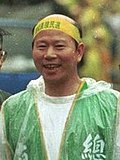You can help expand this article with text translated from the corresponding article in Chinese. (December 2021)Click [show] for important translation instructions.
|
| |||||||||||||||||||||||||
All 162 seats in the Legislative Yuan 82 seats needed for a majority | |||||||||||||||||||||||||
|---|---|---|---|---|---|---|---|---|---|---|---|---|---|---|---|---|---|---|---|---|---|---|---|---|---|
| Turnout | 72.02% | ||||||||||||||||||||||||
| |||||||||||||||||||||||||
 | |||||||||||||||||||||||||
 Elected member party by seat
| |||||||||||||||||||||||||
| |||||||||||||||||||||||||
Legislative elections were held in Taiwan on 19 December 1992. [1] [2]

